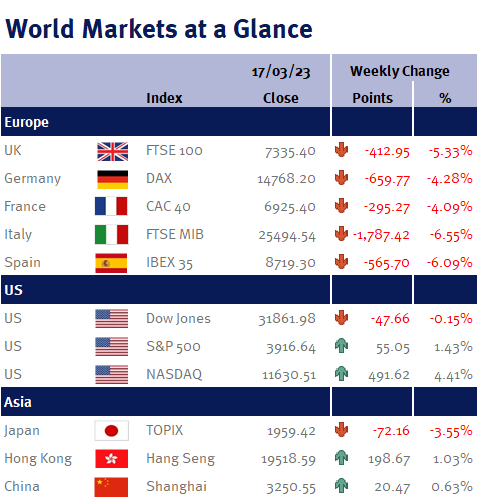Elsewhere, the ECB increased Eurozone interest rates by 0.50%. While ideally policymakers would have left interest rates unchanged given the nervousness in the financial markets, they had painted themselves into a corner over recent weeks by explicitly stating that they would increase interest rates by 0.50% during their March meeting (please see here).
Although the ECB justified this interest rate increase by saying that financial-stability (i.e. the banking sector) is different from price-stability (i.e. inflation), the problem is that a central bank’s interest rate policy does impact the banking sector and it would seem more logical to us if the ECB had focused on the most important problem in the short-term (i.e. confidence in the banking sector due to its importance to the wider economy).
We have said many times over the past few months (for an example, please see here), that in being too aggressive in increasing interest rates central bank policymakers run the risk of becoming Milton Friedman’s ‘the fool-in-the-shower’ (where a person gets burnt by hot water after they turn the hot water all the way up, given the shower water initially came through cold). And unfortunately this is now coming home to roost: by increasing interest rates so much in such a short period of time, they clearly haven’t taken into account the impact of their previous increases and that has caused banks, such as SVB, issues.
Additionally, this will have implications on the wider economy as banks are now likely to further tighter their lending requirements in the short-term as they will want to build-up their liquidity – and less lending will further slow the global economy.
Also, one has to ask if inflation is the problem policymakers keep saying it is. We have long argued that UK inflation will fall sharply this year, simply due to what is known as base effects and could potentially be below the BoE’s 2% target by the end the year – and interestingly this week during the Budget, Jeremy Hunt, the Chancellor of the Exchequer, said that the OBR now expects UK CPI inflation to end the year at 2.9% (it is currently 10.1%).
Furthermore, lower commodity prices will help bring inflation down. For example, the cost of a barrel of Brent Crude Oil continued to weaken this week, falling by more than 10%. And interestingly, not only did Wednesday’s (15 March 2023) US PPI data (wholesale inflation) come in below market expectations across every major aggregate, but the previous data reading saw a significant downward revision – which clearly suggests to us that inflation pressures are easing.
In the week ahead we have monetary policy meetings at the Fed and BoE.
Additionally, we have US housing data, US durable goods orders, US, UK, Eurozone & Japanese PMI, UK & Japanese CPI inflation and UK retail sales.
Investment Management Team


